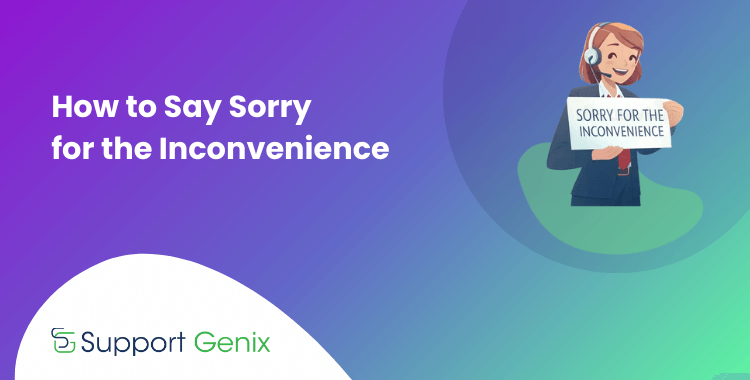How Bad Customer Service Affects Your Business
Bad customer service can be a business’s worst nightmare. It can cause customers to become dissatisfied with your products or services, damaging your reputation and leading to decreased profits. Understanding how bad customer service affects your business is essential for ensuring customer satisfaction and the success of your company. In this blog post, we’ll explore how bad customer service can impact the growth of your business.
Support Genix
WordPress Support Ticket Plugin
Take Your Customer Support to The Next Level and Boost Customer Satisfaction Rates
Several Factors How Bad Customer Service Affects Your Business

Impact on Reputation
In a world where reviews can make or break a business, providing outstanding customer service has become more paramount than ever before. Conversely, poor customer service can potentially lead to major reputational damage for businesses of all sizes. Every customer encounter with a business is an opportunity to build or break trust, which directly affects your company’s image.
Negative interactions with customers, if not managed effectively, can quickly lead to negative online reviews, word-of-mouth complaints, and a damaged image. With so much competition out there, companies must prioritize excellent customer service to maintain a positive reputation and build a loyal customer base. Otherwise, the consequences of poor customer service could be devastating to your company’s bottom line.
Some examples of Businesses with bad Customer Service:
According to various sources, here are some examples of businesses that have suffered from a poor reputation due to bad customer service:
- Bank of America: Bank of America has been mentioned as one of the worst companies for customer service in multiple reports and articles. Customers have complained about issues such as long waiting times, unhelpful representatives, and difficulties resolving problems.
- CenturyLink: CenturyLink, a telecommunications company, has also been criticized for its poor customer service. Customers have reported billing errors, unreliable service, and difficulties reaching customer support.
- US Airways: US Airways, now part of American Airlines, has received negative feedback regarding its customer service. Complaints have included mishandled baggage, poor communication, and unhelpful staff.
- Comcast: Comcast, a cable and internet provider, has faced widespread criticism for its customer service. Customers had expressed frustration with long wait times, inconsistent service quality, and difficulties with billing and technical support.
- United Airlines: United Airlines has been involved in several customer service controversies. Instances of poor customer service include forcibly removing passengers from flights, mishandling luggage, and poor communication during flight disruptions.
Effect on Customer Loyalty
As a business owner, you know that customer loyalty is crucial for the success of your company. However, what you may not realize is how bad customer service affects your business. When a customer has a negative experience with your company, they are more likely to share that experience with others, either through word of mouth or online reviews.
This can damage your reputation and turn away potential customers. Additionally, dissatisfied customers are more likely to take their business elsewhere, meaning that your profits may suffer as a result of bad customer service.
Ultimately, investing in excellent customer service is essential for maintaining your customers’ loyalty and for your business’s long-term success.
Recommended Blog for You
👉 6 Best WordPress Ticket Management Plugins
👉 Top 5 Woocommerce Support Ticket Systems
👉 5 Best Email Ticketing System Plugins for WordPress
Why customer service is essential for building customer loyalty:
When customers have an excellent experience with customer service, they are more likely to become loyal and repeat customers. Here are some key reasons why customer service is essential for building customer loyalty:
Resolving Issues
Effective customer service involves addressing and resolving customer issues promptly and efficiently. When customers encounter problems or have concerns, excellent customer service can provide quick solutions, ensuring their satisfaction. By resolving issues effectively, customer service builds trust and demonstrates a commitment to customer satisfaction.
Personalized Assistance
Good customer service goes beyond just resolving issues. It involves providing personalized assistance to customers, understanding their needs, and offering tailored solutions. This personalized approach provides customers feel valued and appreciated, leading to a stronger emotional connection and increased loyalty.
Building Relationships
Customer service is an opportunity to build relationships with customers. By engaging in meaningful conversations, showing empathy, and actively listening to customers, customer service representatives can establish rapport and create a positive customer experience. This personal connection fosters loyalty as customers feel connected and trust with the brand.
Exceeding Expectations
Exceptional customer service goes above and beyond customer expectations. Going the extra mile to surprise and delight customers can leave a lasting impression. Customers who receive exceptional service that exceeds their expectations are more likely to develop a strong affinity towards the brand and become loyal advocates.
Feedback and Improvement
Customer service acts as a valuable feedback channel for businesses. Companies can identify lacking areas for improvement and make necessary changes by actively seeking customer feedback. They can also boost customer satisfaction and loyalty by using customer feedback to improve their products and services continually.
Financial Consequences
Bad customer service can have significant financial implications for businesses. Here are some of the financial consequences of providing poor customer service:
Lost Sales
Poor customer service can result in lost sales, as dissatisfied customers are more likely to switch to competitors. According to NewVoiceMedia’s 2018 “Serial Switchers” report, “Businesses lose over $75 billion annually due to poor customer service”. When customers have a negative experience, they are less likely to make repeat purchases or recommend the business to others, leading to a decline in sales.
Customer Acquisition Costs
Retaining existing customers is usually more cost-effective than acquiring new ones. When customers have a negative experience with customer service, they are more likely to leave and seek alternatives. This means that businesses have to invest more resources in marketing and advertising to attract new customers, resulting in higher customer acquisition costs.
Negative Word of Mouth
Poor customer service can lead to negative word of mouth, where dissatisfied customers share their negative experiences with others. This can severely impact a company’s reputation and brand image, making it harder to attract and retain new customers. According to various studies, customers are more likely to share their bad customer service experiences compared to good ones, amplifying the negative impact on a business’s bottom line.
Increased Customer Support Costs
Providing subpar customer service may result in an increase in customer support costs. When customers experience issues or have questions, they are more likely to reach out to customer support for assistance. Inadequate customer service can lead to longer call handling times, more escalated inquiries, and increased staff workload, requiring additional resources and increasing expenses.
Damaged Customer Lifetime Value
Poor customer service can erode customer loyalty and decrease customer lifetime value (CLV). CLV refers to the total revenue of a customer who generates over their entire relationship with a company. Dissatisfied customers are less likely to make repeat purchases, reducing their CLV. This loss of long-term revenue can have a significant impact on a business’s financial performance.
Employee Morale and Productivity
The success of a business depends on employee productivity and motivation as well as product or service quality. Poor employee morale can lead to decreased productivity, which could have a detrimental effect on the company’s bottom line. Here are some ways in which it can affect employees:
Lowered Morale
Employees consistently dealing with dissatisfied and angry customers due to poor customer service can lead to lowered morale. Dealing with unhappy customers can be emotionally draining and demotivating for employees, causing them to feel unappreciated and undervalued.
Decreased Job Satisfaction
Poor customer service can decrease employee job satisfaction. If they are unable to provide effective solutions or resolve customer issues due to inadequate support or resources, they may feel frustrated and helpless in their roles.
Increased Stress
Dealing with irate customers and handling multiple complaints can significantly increase stress levels among employees. This can result in burnout, decreased productivity, and harm to overall well-being.
Reduced Productivity
Poor customer service can create inefficiencies and hinder employees’ ability to perform their tasks effectively. For example, if there is a lack of communication or coordination between departments, it can lead to delays in resolving customer issues, causing frustration and reducing productivity.
Higher Employee Turnover
Constant exposure to the negative effects of poor customer service can lead to higher employee turnover. Employees may become disenchanted with their roles and seek employment elsewhere, resulting in increased recruitment and training costs for the company.
Negative Impact on Team Dynamics
Poor customer service can create tension and strain within teams. Employees may become dissatisfied with their colleagues or superiors if they feel unsupported in delivering satisfactory customer experiences. This can lead to a breakdown in teamwork and collaboration, further impacting productivity.
Support Genix
WordPress Support Ticket Plugin
Take Your Customer Support to The Next Level and Boost Customer Satisfaction Rates
Strategies to Improve Customer Service
Providing the high-quality customer service is crucial to the success of any business. Poor customer service experience can have devastating effects on a company’s reputation and bottom line. Customers who experience bad service are unlikely to remain loyal and may even spread negative reviews to their friends and family.
Some practical tips and strategies to Improve Customer Service:
Improving customer service requires a combination of effective communication, empathy, and problem-solving skills. Here are some practical tips and strategies to enhance these areas:
Active Listening
Encourage customer service representatives to listen to customers actively. This involves giving them their full attention, avoiding interruptions, and asking clarifying questions to ensure a complete understanding of the issue. Active listening shows customers that their concerns are being heard and understood.
Clear Communication
Train customer service representatives to communicate clearly and concisely. Encourage them to use plain language, avoid jargon, and provide step-by-step instructions when necessary. Clear communication helps customers understand the solutions and builds trust in the support provided.
Empathy and Understanding
Teach customer service representatives the importance of empathy and understanding. Encourage them to put themselves in the customer’s shoes and acknowledge their emotions. Empathetic responses can de-escalate tense situations and make customers feel valued.
Positive Language
Emphasize the use of positive language during customer interactions. Encourage customer service representatives to frame responses in a positive manner, focusing on what can be done rather than what cannot. This helps create a more optimistic and helpful atmosphere for customers.
Problem-Solving Skills
Train customer service representatives in effective problem-solving techniques. Teach them to analyze issues, investigate root causes, and propose appropriate solutions. Empower them to take ownership of customer problems and work towards resolving them promptly.
Personalization
Foster a culture of personalization in customer service. Encourage representatives to address customers by name, reference previous interactions, and tailor solutions to their specific needs. Personalization creates a more personalized and meaningful experience for customers.
Timely Responses
Set clear expectations for response times and ensure that customer service representatives adhere to them. Promptly acknowledge customer inquiries, even if a resolution may take longer. Timely responses demonstrate responsiveness and a commitment to customer satisfaction.
Continuous Training and Feedback
Provide ongoing training to customer service representatives and regularly solicit feedback from them. Offer opportunities for skill development, share best practices and address any areas of improvement. Continuous training and feedback help employees refine their customer service skills.
Customer Surveys and Feedback
Implement customer surveys and feedback mechanisms to gather insights and measure customer satisfaction. Use this feedback to identify specific areas for improvement and make the necessary adjustments to enhance the customer experience.
Celebrate Successes
Recognize and celebrate exceptional customer service experiences and achievements. Acknowledge and reward employees who consistently provide outstanding support. Celebrating successes boosts morale and motivates employees to continue delivering excellent customer service.
Conclusion
In conclusion, considering how bad customer service affects your business can be significant and far-reaching. It can cause a lot of damage to the reputation of the company, leading to a loss of trust and credibility among customers. Dissatisfied customers are more likely to switch to competitors, resulting in decreased customer loyalty and potential financial loss.
Additionally, poor customer service can erode engagement levels among employees, impacting overall company morale. The consequences of bad customer service include missed growth opportunities, increased support costs, and decreased customer satisfaction and retention. It is crucial for businesses to prioritize excellent customer service to mitigate these negative effects and foster a positive customer experience.
By investing in training, effective communication, and problem-solving skills, businesses can enhance customer satisfaction, loyalty, and, ultimately, their bottom line.

